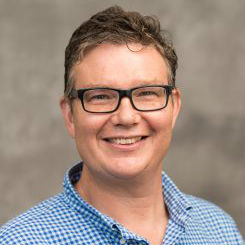A commitment to planetary science

By Michael R. Meyer, Leader Academic Platform
From where did your passion for planetary science come? Mine came in part from Carl Sagan and the Cosmos television series in the early 1980s. The program seized upon my love for adventure and made the search for life in the Universe seem accessible to someone from a small village where obtaining an advanced degree was rare. Although interested in astronomy, I was advised to study Physics as a Bachelors student as a more practical option. In those days, ‘Planetary Science’ meant studying only bodies in our Solar System. Ten years later, just as I was completing my PhD in astrophysics, the discovery of 51 Peg b was announced by Michel Mayor and Didier Queloz from Geneva (at a meeting in Florence I was supposed to attend, but didn’t because I was already late for arrival at my first post-doc in Heidelberg). The discussion of how our own Solar System fit together with what we knew about other stellar systems had already started among dozens of researchers in the early 1970s. However by 1998, hundreds of people from many fields had joined in the search for exoplanets and ‘planetary science’ began to take on a new meaning and urgency.
Today, students interested in planetary science have many options for advanced training internationally. Different countries and institutions within them take different approaches to training PhD students and post-docs for successful careers in research, education, and industry based on skills they learn through their work in planetary science. In a field where many disciplines contribute to create a whole which is greater than the sum of the parts, there is a strong tension between becoming an expert in one area (with something specific to contribute) and maintaining breadth across many fields (to see the connections that others miss).
To train the next generation of leaders in the field, we have created a Doctoral Network through the NCCR PlanetS framework. What does this mean? In practical terms, it is a specific program whereby junior scientists may earn a certificate in planetary science endorsed by PlanetS. Though not a degree, it demonstrates a commitment to and specific training in planetary science that can be a valuable element of your CV. How does one earn this certificate? There are three requirements: a) complete at least two courses from a list of interdisciplinary topics offered by faculties of the PlanetS participating institutions; b) conduct an interdisciplinary research project done primarily with researchers who are not members of the main research group; and c) participate in at least two training events sponsored by PlanetS. The program is open to both PhD students and post-docs.
How did we come up with these requirements? A survey was conducted among the senior members of PlanetS in order to determine which aspects of such interdisciplinary training are seen as most valuable in junior scientists. We also reviewed several prominent international programs to see what course topics are generally required for planetary science students. Having developed a list of topics we feel we should offer, we reviewed those already offered to see where we might have gaps, requiring the development of new courses in Switzerland.
This spring, we completed a pilot project, offering an advanced course in Exoplanets for students from ETH and UniZ, with two students participating remotely from Bern. It did not always go smoothly, but we learned a lot about the challenges one faces in presenting a course to distant learners. We anticipate offering another pilot course this fall and additional ones next spring.
This spring, we helped sponsor the 45th Saas-Fee Advanced Course on Circumstellar Disks and Planet Formation and this summer there is another course organized through the U. Bern Center for Habitability. This fall, we will be offering another training opportunity focused on professional development including outside speakers, workshops, and local laboratory site visits. The event will be held at U. Bern in early September. As for interdisciplinary research projects that stretch across multiple groups, some already have this deeply embedded in your work plans. If not, and you are interested, please consult your research supervisor for ideas that might work for you.
We look forward to improvements as our program moves forward. Ultimately, we hope this program will evolve into some sort of degree-granting entity and the added visibility that would bring. However for now, we think we have a very practical program that focuses on what value we can add to the training of junior students throughout PlanetS. If you have any questions, comments, or suggestions, please do not hesitate to contact me. It is a very exciting time to be starting your careers in planetary science. Hopefully in the future, you will be able to look back on your time in PlanetS and identify some crucial elements of training that helped you to succeed in ways you cannot possibly imagine today. If not, the Academic Platform is not doing its job!
Categories: Internal Newsletter

